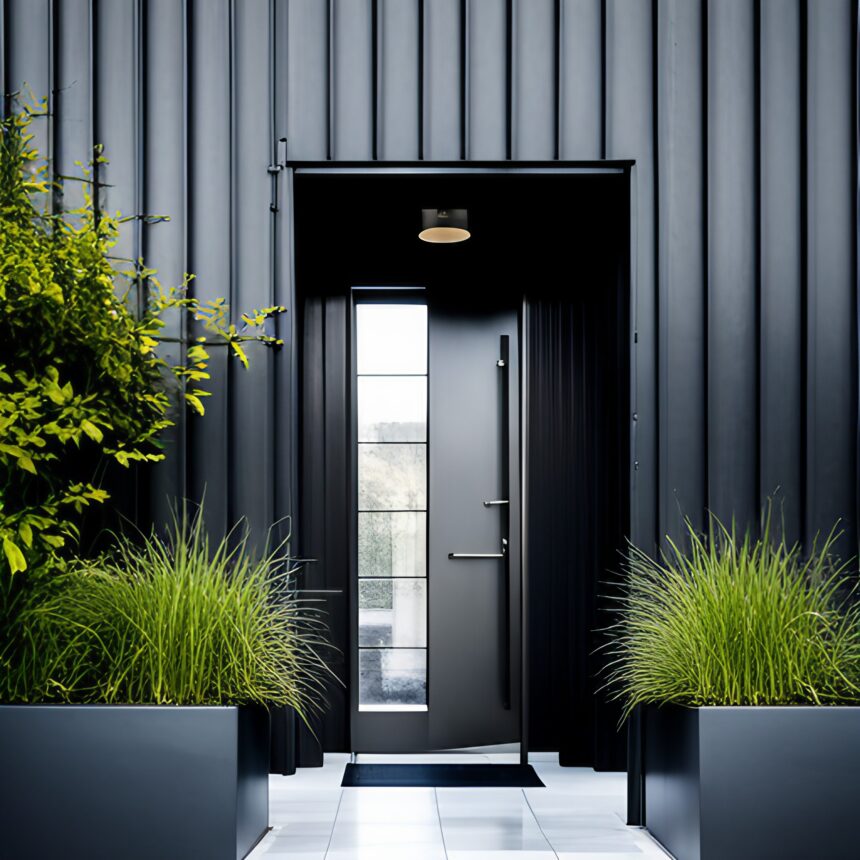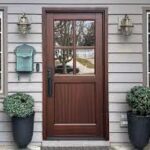Steel doors are widely recognized as one of the most reliable and durable choices for both residential and commercial properties. These doors offer superior protection, resistance against the elements, and a sleek, modern appearance. If you’re looking for an entryway that combines strength, security, and functionality, steel doors are an excellent investment.
What Are Steel Doors?
Steel doors are heavy-duty doors made primarily from steel, often with a hollow core or solid core, depending on the level of security and insulation required. These doors are designed to withstand external forces, offering protection against break-ins, extreme weather conditions, and physical damage. Steel doors can be customized with a range of finishes, colors, and hardware, making them suitable for various applications.
Types of Steel Doors
1. Hollow-Core Steel Doors
Hollow-core steel doors are commonly used in commercial and industrial settings where strength and durability are paramount. These doors are constructed with a hollow interior that provides strength and stability, while keeping the overall weight manageable. They are highly resistant to forced entry and can be insulated to enhance energy efficiency.
2. Solid-Core Steel Doors
Solid-core steel doors are used when maximum security and protection are needed. These doors are typically made with a solid, reinforced interior, providing an added layer of strength and resistance to break-ins. Solid-core doors are ideal for high-security areas such as vaults, safes, or secure entryways in commercial buildings.
3. Fire-Rated Steel Doors
Fire-rated steel doors are specifically designed to withstand high temperatures for a set period, making them ideal for areas that require fire protection. These doors are often used in fire exits, commercial kitchens, warehouses, and public buildings. They come with a fire-resistance rating that indicates how long the door can withstand fire before it starts to fail.
4. Insulated Steel Doors
Insulated steel doors are built with an insulated core that helps with temperature regulation, reducing energy consumption and enhancing indoor comfort. These doors are perfect for commercial and residential buildings that require enhanced energy efficiency, as they help keep buildings warm in winter and cool in summer.
5. Decorative Steel Doors
While steel doors are known for their durability and security, they can also be designed to be aesthetically pleasing. Decorative steel doors are often used in residential properties, offering a combination of strength and visual appeal. These doors can be customized with various finishes, panels, and glass inserts to match the architectural style of the home.
Advantages of Steel Doors
1. Unmatched Security
Steel doors are incredibly strong and resistant to forced entry. They provide the highest level of security, making them an ideal choice for commercial buildings, warehouses, and homes that need protection from theft or vandalism. Their robust construction makes them difficult to break, ensuring peace of mind for property owners.
2. Durability and Longevity
One of the primary reasons to choose steel doors is their long lifespan. Steel is inherently resistant to corrosion, rust, and wear, making steel doors highly durable and capable of withstanding harsh environmental conditions. Whether exposed to rain, snow, or extreme temperatures, steel doors remain reliable and functional for many years.
3. Fire Resistance
Fire-rated steel doors are specially designed to withstand high temperatures, providing crucial protection in case of a fire. These doors can hold up against flames for up to several hours, giving occupants time to evacuate the building safely and preventing the spread of fire to other areas.
4. Low Maintenance
Steel doors are relatively low-maintenance compared to doors made from other materials. They do not warp, crack, or fade over time. Routine cleaning and occasional lubrication of moving parts are typically all that is needed to maintain their functionality and appearance.
5. Energy Efficiency
Insulated steel doors can help improve the energy efficiency of your building by reducing heat loss in winter and preventing excess heat from entering during the summer months. This helps to keep heating and cooling costs down, making steel doors a cost-effective choice in the long run.
6. Aesthetic Appeal
While steel doors are known for their strength, they also offer a sleek and modern appearance. Available in a wide range of finishes, colors, and styles, steel doors can be customized to match the aesthetic of your home or business. They can also be fitted with glass panels for added visual appeal.
Applications of Steel Doors
1. Residential Use
Steel doors are increasingly popular in residential homes due to their security benefits and aesthetic versatility. Many homeowners choose steel entry doors for their front entrances, knowing that they provide protection against intruders while also adding a modern, polished look to the home. Additionally, steel storm doors offer enhanced protection from the weather.
2. Commercial and Industrial Use
In commercial and industrial applications, steel doors are used to secure high-traffic areas, warehouses, storage units, and factories. They are often equipped with high-security locks and reinforced hardware to provide the maximum level of protection. Fire-rated steel doors are particularly crucial in areas that require fire protection.
3. Government Buildings and Institutions
Steel doors are commonly found in government buildings, schools, hospitals, and other public institutions. These doors are used to secure entrances, stairwells, and other critical areas, offering enhanced security and protection.
4. Garage Doors
Steel is a popular material for garage doors, thanks to its strength and resistance to the elements. Insulated steel garage doors help keep the temperature inside the garage stable, which is especially beneficial if the garage is used for living or storage space.
How to Choose the Right Steel Door
1. Consider the Level of Security Needed
If security is your primary concern, opt for a solid-core steel door or a fire-rated steel door for maximum protection. These doors are designed to withstand break-ins and offer a higher level of durability.
2. Choose the Right Material
While most steel doors are made from high-quality steel, there are different finishes and coatings available to suit your needs. Galvanized steel is a popular choice for its resistance to rust and corrosion, making it ideal for outdoor or high-moisture environments.
3. Insulation Needs
For areas that require energy efficiency, choose insulated steel doors. These doors help maintain a comfortable indoor temperature by preventing heat transfer, reducing energy bills, and improving overall building efficiency.
4. Aesthetic Preferences
Steel doors come in a wide variety of designs and finishes. If aesthetics matter to you, consider a decorative steel door with custom panels or glass inserts. These options allow you to have a secure door while still achieving a stylish and modern look.
Maintaining Steel Doors
1. Regular Cleaning
To keep your steel doors looking their best, clean them regularly with a soft cloth and mild detergent. Avoid abrasive materials or harsh chemicals that could damage the finish.
2. Lubrication
Ensure that hinges, locks, and other moving parts are lubricated to maintain smooth operation. Use a silicone-based lubricant to prevent rust and ensure proper function.
3. Inspect for Damage
Check your steel doors regularly for signs of wear, dents, or rust. If you notice any issues, address them promptly to avoid further damage. Steel doors can often be repaired without needing full replacement.
Conclusion: Why Steel Doors Are a Smart Investment
Steel doors are a versatile, durable, and secure choice for both residential and commercial properties. Whether you’re looking to enhance your property’s security, improve its energy efficiency, or simply add a modern aesthetic, steel doors offer an exceptional combination of benefits. With proper care and maintenance, a steel door can last for many years, providing reliable protection and adding significant value to your home or business.





